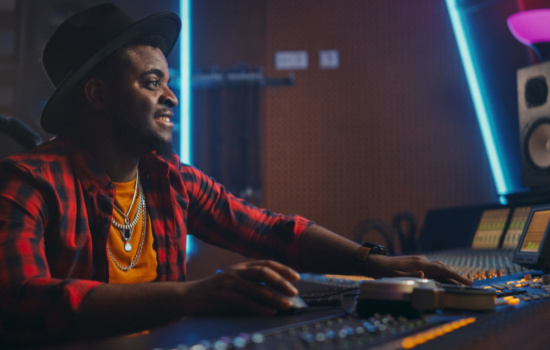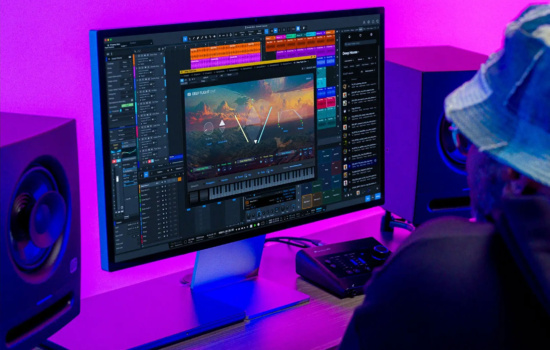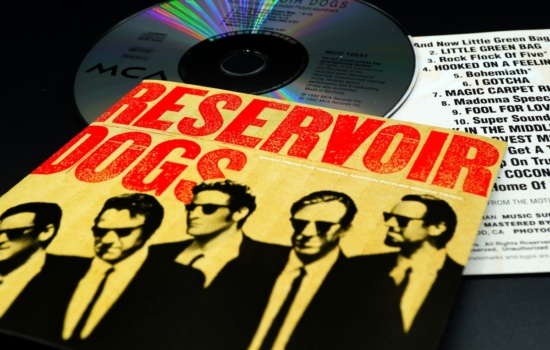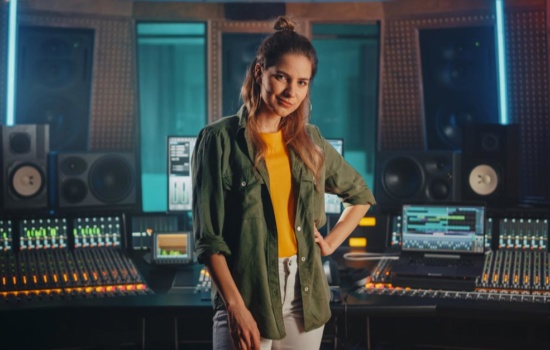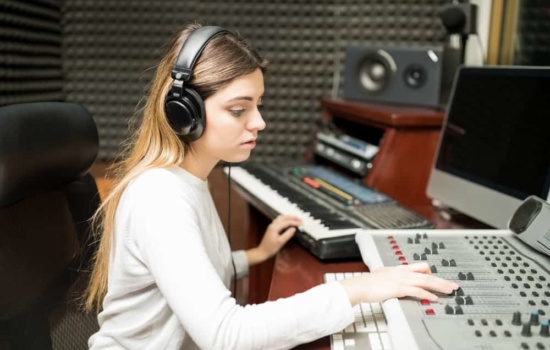Music Career Finder
Survey Start
Music Producer Career Guide: Roles, Skills, and How to Get Started
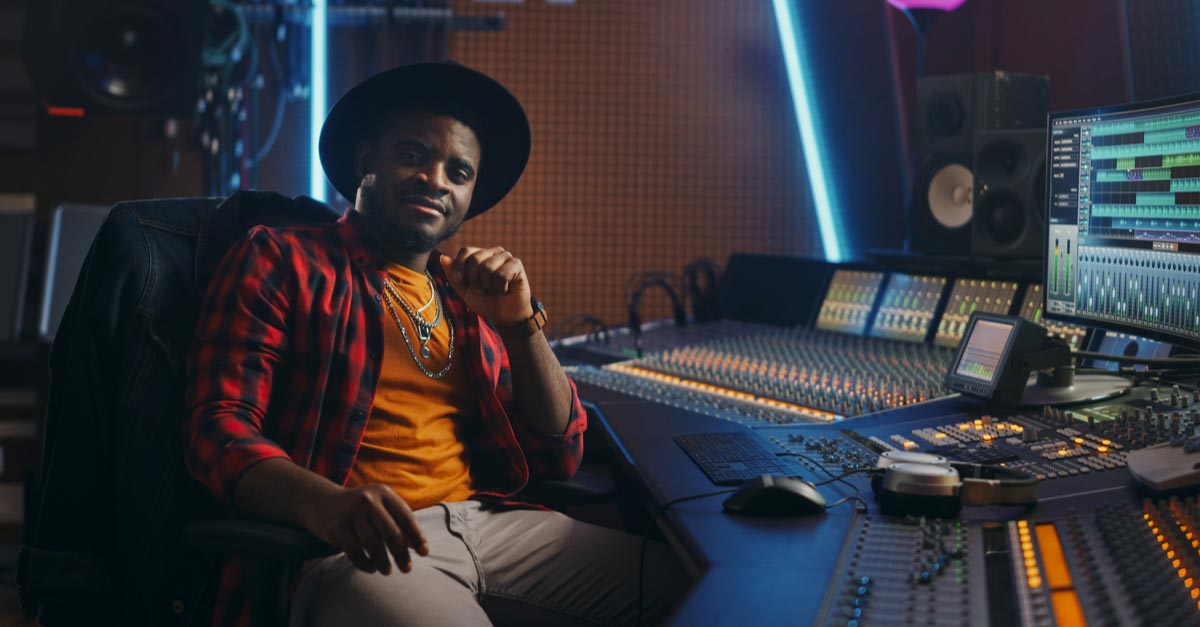
How To Become a Music Producer Career Guide: Roles, Skills, and How to Get Started
- Music producers help guide a song, both creatively and practically, to its final recorded form
- You’ll need to know the technical aspects of recording so you can better collaborate with audio engineers (or do the engineering yourself)
- It’s a good idea to play an instrument or at least have a basic understanding of music theory
- The best way to get started is to record and produce your own music and produce some songs for others pro bono
- The average annual income for a successful music producer is about $88k a year, but it can take years to get to this level
- Career Description
- Salary
- Career Outlook
- Career Path
- Experience & Skills
- Education & Training
- Sources
- References
Career Description
Music producers, also called record producers, lead the creative and technical aspects of recordings, whether for a single song, an album, or a soundtrack.
What Does a Music Producer Do?
Here are the responsibilities you should be prepared to do as a music producer:
- Schedule recording sessions
- Hire session musicians
- Help with spending the client’s budget
- Song arrangement (and sometimes songwriting)
- Playing instruments as needed
- Audio engineering (if no engineer is present)
- Guide musicians and singers to get their best possible performances
- Audio editing, mixing, and mastering
A Day in the Life of a Music Producer
Grammy-winning Music Producer Sylvia Massy talks about strategies she used with her artists…
It’s very common for music producers to work long hours, especially if you’re hired to work in a professional recording studio.
For example, Grammy-winning producer Trina Shoemaker (mixer, record producer, sound engineer for QOTSA, Sheryl Crow, Brandi Carlile) said she worked 10-15 hour days in the beginning.
Salary
- Total Pay Range
$66K – $123K/yr
- Base Pay
$49K – $91K/yr
- Additional Pay
$17K – $32K/yr
- Estimated Most Likely Total Pay
$88K/yr (average of 25th to 75th percentile)
All of the producers we talked to pointed out how variable the salary of a music producer can be, just to be honest about your music producer salary expectations.
But the above numbers match with what Shoemaker told us – she made an average of $70k to $130k per year, with her first-year salary being in the $15k to $20k range.
Who Does a Music Producer Work For?
A producer could be independent, working with artists and bands to record their music.
Or they could be employed by a music production company, creating music for use in advertising, film, live shows, streaming, or for release through a record label.
They might work for a tech company like Google, a major entertainment company like Disney, a publisher like Universal, a TV or Radio outlet, or for a school or large university.
How a Music Producer Gets Paid
The two main ways a music producer gets paid are from upfront fees and backend royalties.
Depending on your experience and skill as a producer, you can charge an upfront fee of anywhere from $200 to thousands of dollars per song.
On top of that, you can ask for a percentage of the publishing rights, which would earn you performance and mechanical royalties. Your cut of the royalties can vary widely, but it’s common to get 3-4% of the royalties of a song you produced.
Some producers will charge for revisions, meaning they charge for any changes the client asks them to make to the production. Most producers who charge for revisions will offer a certain number of free revisions included in the initial upfront fee.
How To Collect Royalties as a Music Producer
To collect these royalties, you need to be registered with a Performance Rights Organization and a publishing admin company (which should partner with the Mechanical Licensing Collective for mechanical royalties).
If you’re splitting streaming royalties with an artist or band, make sure your percentage cut is set up with the digital distributor. This means the distributor will send you your cut directly.
The Potential Salary of Successful Producers
The most successful music producers can earn tens or even hundreds of millions of dollars. Producers of hit songs command high fees for their time and services to an artist or client.
There are producers who work on a project fee-only basis (called “work-for-hire”) but most producers will keep partial ownership of their recordings so they can collect royalties if the song turns out to be a hit.
Without exception, the most successful producers didn’t start out earning millions of dollars and commanding high fees. They had to prove themselves first and become well-known in the music industry.
Hey, what do you think about trying our new Music Career HelperMusic Career Helper really quick? It’s totally free and could help get your career moving fast! Give it a try. It’s totally free and you have nothing to lose.
Career Outlook
Becoming a music producer can lead to a terrific career.
While a comfortable, regular income is not likely to happen overnight, people who are passionate about music and technology can build and sustain a viable career over time.
More and more musicians and songwriters are learning to produce music on their own from their bedrooms. Does this pose a threat to aspiring music producers?
Well, as in any creative career, people will hire you for your ideas and creativity first and foremost. So as long as you are creative, are enjoyable to work with, and elevate the music at hand, you can find people who will want to work with you.
But it is a competitive niche in the music industry, so you have to be passionate about producing to succeed.
Being a Music Producer In a World of Artificial Intelligence
Artificial intelligence can now produce music on its own, all it needs is a simple prompt from a human.
Does that mean human music producers will be replaced by AI?
Not exactly. If we (humans) handle AI properly, it could end up helping producers.
Jason LaRocca, Grammy-nominated engineer, mixer, and producer, told us AI could help you create music but that humans are still in charge.
“I think you could maybe use AI ultimately on a creative level for certain inspiration, maybe,” he said. “But I think you have to ultimately…still write music. You still have to make music, and it has to be something you make.”
People will hire you as a producer for your creativity and ideas. So focus on stretching yourself as a producer. Try to make music that’s so creative and authentic that a computer could never make.
Gordon Raphael, engineer and producer who’s worked with The Strokes and Regina Spektor, told us he’s more interested in music made by humans.
“I’m so fascinated by human music,” he said.
“…The thing about music that kills me is hearing an experience and a story turned into music. What happened to this person? Why are they that way? It’s nothing to do with the technical chord structure or the production sounds — the things that AI can get. AI would have to convince me that it had a little struggle that no one else had, and it wants to tell me about this in a very clever way.”
Career Path
As with any aspect of the arts as a career, you won’t likely be earning huge money right out of the gate. The important thing is to affiliate and collaborate with other musicians to get a foot in the door.
Most artists, including producers, must support themselves with a “day job” when starting out. The important thing is that a day job should pay living costs and be flexible enough, while not being so demanding or tiring that it leaves no time and energy for producing music.
Starting Out
When you’re just starting out as a producer, when you don’t yet have clients, the best thing to do is make your own music. That way, you have something to show potential clients.
You should also have a page on your website that outlines what you offer and a way for people to contact you.
Freelance Music Producer
As a freelance/independent music producer, you would help clients create pro-level recordings.
Clients can be many different types of people depending on who you want to work with, including indie artists, record label artists, brands, and even podcasts.
In this role, you would typically have a home studio setup where your clients can come to record.
In-House Music Producer
An in-house music producer works in a professional recording studio alongside other producers, audio engineers, and interns.
Sometimes they’re self-employed, sometimes they are employed by the studio, and sometimes they work directly for a record label.
They work with whoever can afford to pay for the studio and the recording professionals involved, which could include indie artists, record label artists, and film companies creating soundtracks.
In this role, you’ll need to know how to work a soundboard, work with a team of people, and work quickly within the time the client has booked.
Media Composer for Film, TV, and Video Games
As a composer for visual media, you would be working with brands and filmmakers to create the soundtrack for film, TV shows, ads, and video games.
Many times, you would have a home studio and work as a self-employed composer.
Music Programmer or Sound Designer
As a sound designer, you would create unique sound effects and aural landscapes for music, film, video games, or sound libraries.
This can have a lot of overlap with music production but it does require technical sound manipulation skills.
Live Sound Producer/Engineer
A live sound engineer manages the sound for live performances, which includes setting up sound equipment, running pre-show sound checks, and mixing the audio live so it continues to sound good for the audience.
Many live engineers start by working with local venues or bands to gain experience with live sound equipment.
The Career Path of Legendary Music Producer Quincy Jones
In 1982 music legend Quincy Jones produced one of the best-selling albums of all time, Michael Jackson’s Thriller, and today he is worth about a half-billion dollars.
He didn’t start out that way, of course.
After attending Berklee College of Music in Boston during the 1950s, Jones first worked as a jazz arranger and trumpeter for various bandleaders, including Lionel Hampton, Count Basie, Gene Krupa, and others. He even played trumpet in the studio recording orchestra backing up Elvis Presley.
Then he formed his own 18-piece jazz group and toured across Europe to glowing reviews and accolades, but went broke in the process, since the performance fees couldn’t support such a large group.
It wasn’t until the 1960s that Jones achieved the first of his big breaks as a producer, becoming the first African American vice-president of the Mercury record label. He went on to produce many legendary recordings for artists such as Frank Sinatra, Sarah Vaughan, Peggy Lee, Ray Charles, and Dinah Washington.
Later he also produced music for major Hollywood soundtracks, TV shows, and film musicals like The Color Purple, The Fresh Prince of Bel-Air, and The Wiz, respectively. He also produced the 1985 mega-hit song featuring most of the top music stars of the time, “We Are The World,” to raise money for victims of a deadly famine in Ethiopia.
Experience & Skills
What skills does a music producer need?
- Playing an instrument
- Writing music
- Audio engineering
- Arranging
- Time management
- People skills
- Business skills
Producing music is both an art and a craft. So let’s talk about the creative and technical skills you’ll need…
Playing an Instrument
The advantages of playing piano or guitar include being able to play chords and hear the harmony together with the melody. There are also great producers who play violin, trumpet, drums, bass, or can sing. Any instrument will do if one is proficient.
The reason producers should play an instrument and know music theory is so they can effectively communicate with musicians about the music being recorded. Musicians have a shared “lingo” and use special terminology that non-musicians would have difficulty understanding.
Writing Music
The producer must be able to see and hear the finished recording in their mind. Reading and writing music is often the best way to do this.
It’s also super-helpful to be able to prepare the written music for sessions. Since session musicians tend to read well, having written parts could save a lot of time, when “time is money” in a recording session.
You don’t need to know how to read and write sheet music, you can still share your melodic ideas by humming or playing your instrument. And any good session musician can play by ear.
Arranging and Orchestration
If you hire arrangers or orchestrators for a song you’re producing, you should be able to communicate clearly with them on paper what the music should sound like.
Many producers have a hand in arranging the music to be recorded. Arranging involves taking a musical work and adapting it for specific instrumentation.
Many Songwriters come to a Producer with the basic song melody, lyrics, and chord progression in place. Then the Producer must make an arrangement of the song with the available instruments
It’s also helpful to be fast because sometimes arrangements and orchestrations must be done on the fly when the timer is ticking down on a recording session.
Studio Engineering
Many producers start out as recording engineers, working at mixing consoles, learning how to set up microphones, and learning the ins and outs of your chosen digital audio workstation (DAW). (Check out our picks for the best DAWs for music producers).
Working the knobs of a soundboard is a terrific way to familiarize yourself with the modern recording environment.
Producers who know how to add effects (FX) to enhance the music, can layer tracks, overdub solos, create a rough and a final mix, and know their way around the gear will always be in demand.
While many music producers are also engineers and can troubleshoot issues with recording hardware and software, not all are. But having a general understanding of how the gear works and being able to troubleshoot the most common problems will be a great asset for the non-engineer working as a producer.
Time Management and Project Management
Time is money, and this is especially true during recording sessions. Often, the studio is rented by the hour or by the day, and the musicians and the engineer are paid by the hour or the day. So every minute counts, not only in terms of the money spent but relative to the outcome of the session.
This means leaving extra time for solving problems. There are always problems. Things always take longer than expected. There’s even a name for this: The Planning Fallacy.
Producers need to be good at managing time, planning sessions, coordinating people and facilities, creating and communicating schedules to all participants in advance, double-checking and confirming with everyone, and being on time, every time.
People Skills
When Quincy Jones recorded “We Are The World” with all those huge pop stars, he hung a sign up at the door to the studio that read: “Check Your Egos At The Door.”
Indeed, dealing with different personality types and the powerful attitudes of temperamental artists and musicians can present a challenge to the most experienced producers and music directors.
Not only must the producer be adept at dealing with outsize egos, but they must also be good at conflict resolution. Being a strong communicator and negotiator helps gain understanding and agreement from participants about complex artistic and technical issues, and there are also specific techniques and etiquette useful for approaching and speaking with celebrities.
Being good with people is how you get more work. If you’re easy to work with and you’re good at what you do, you’ll have plenty of opportunities.
Music Business, Legal Aspects, and Management
Music producers operate in the creative, legal, and business spheres. It’s not enough to have the artistic and technical skills required to produce great music; a producer must also understand the laws, and then be the consummate business expert.
Legal and business frameworks include areas such as music copyrights, music publishing, music licensing, budgeting, finance, marketing, and business management. Music is a part of the larger entertainment industry and is connected to the leisure and media industries as well. Music producers need to understand all these areas.
Education & Training
There isn’t any standard educational requirement for music producers, but some kind of education can be helpful in developing your music producer skills and qualifications and meeting your peers.
If you don’t go to school for music production, you can start with hands-on experience by recording your own and others’ music.
Formal Education
This could be a 2-year, 4-year, or 6-month program. Whatever teaches you what you need to know that fits your budget.
There are reputable fully accredited music production degree programs offered by top music schools in the U.S. and a few abroad as well.
Some are more music-oriented and require applicants to play an instrument already, while others might be focused mainly on the audio engineering, music technology, and music business aspects of becoming a music producer.
There are also non-degree certificate programs, and stand-alone courses available in-person and online.
Education is expensive, mainly due to the high costs associated with hiring the best faculty and building and maintaining fully-equipped recording facilities. Yet many people find ways to pay for it and view school as a transformative investment leading to a future rewarding career.
Self-taught
For some people, it might actually be better to just jump into producing at entry-level positions and learn on the job. You could do this initially by shadowing or interning with an established music producer or audio engineer.
You can also start by recording your own music as well as offering your production services to artists and bands at no- or low-cost.
LaRocca told us he started engineering out of necessity. He was in a band called The Briggs, and they didn’t always have funding or label support.
So he just bought gear, read manuals, and figured things out on his own. He never had any formal schooling.
“I was just kind of determined to figure out how to be part of the music scene in some professional capacity even though I didn’t have a lot of resources,” he said.
Networking Is the Key
Regardless of your education, networking in the music industry is one of the main keys to success as a music producer. Who you know matters just as much as what you know.
Sources

Matt Ross-Spang
Matt Ross-Spang is a Grammy Award-winning engineer, mixer, and producer. At the age of 16, Matt started as an Intern at the legendary Sun Studios and eventually worked his way up to chief engineer. During his time there, he endeavored to bring the recording studio back to its origin by finding, installing, and using the same period equipment that Sam Phillips engineered with in the 1950s. Matt and Sun were featured by Lester Holt for NBC’s Nightly News and the Today Show. NPR also highlighted his work on All Things Considered.
In 2015, Matt left Sun to venture out on his own as an engineer and producer. His first project was engineering and mixing Jason Isbell’s Something More Than Free for acclaimed producer Dave Cobb, which earned him his first Grammy. Around that time, Matt also engineered, mixed, and co-produced Margo Price’s debut album, Midwestern Farmer’s Daughter. Third Man Records released the record in 2016 to much critical acclaim.
Over the years, Matt’s worked with a variety of amazing artists, including John Prine, Jason Isbell, the Hi Rhythm Section, the Drive-By Truckers, Margo Price, Luther Dickinson, Lori McKenna, Anderson East, Elle King, Al Green, and more. In 2017, he engineered Jason Isbell and the 400 Unit’s critically-acclaimed and Grammy-nominated album, The Nashville Sound. He also co-produced and mixed Margo Price’s All-American Made. Matt’s home base is the newly renovated Studio B at Sam Phillips Recording in Memphis, TN.
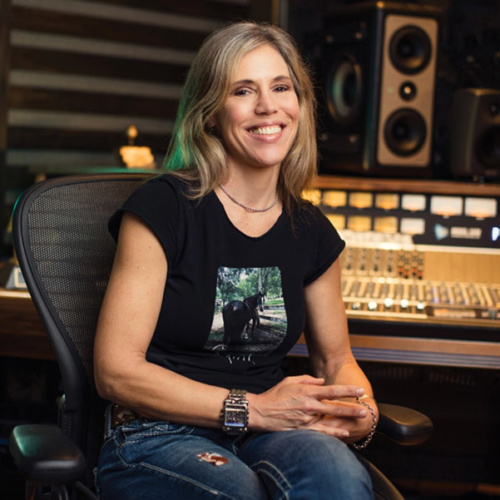
Trina Shoemaker
Trina Shoemaker was born in 1965 and raised in Joliet, Il., about 45 minutes southwest of Chicago. There was nothing she loved more than listening to her dad’s Hi-Fi stereo and comparing it with the other systems in the neighborhood. They were all good, some better than others. Her dad’s was the best and it was loud! By 13 Shoemaker knew she wanted to record albums, whatever that meant, and by 19, she had a little apartment in Los Angeles and an entry-level job at Capitol Records.
It would be a long road finding her way to a console. Her rather circuitous route to recording began in a basement studio in a London flat with artist Hugh Harris, then wound through Rancho De La Luna in Joshua Tree, and further on down to the Mississippi River Delta, where she began by cleaning studios in New Orleans. Eventually, she found her way to Kingsway, Daniel Lanois’ famed studio in the French Quarter where she was hired as a tape op and second engineer in 1991 and quickly became the house ngineer.
During those early Kingsway years, Shoemaker worked on Iggy Pop’s American Ceasar, The Throwing Muses University, Giant Sand’s Glum and Emmylou Harris’ iconic Wrecking Ball, among many others. In 1995, after completing Wrecking Ball, Shoemaker decided to leave Kingsway and strike out on her own. Within a few months she was hired by Sheryl Crow and over the next year recorded Crow’s breakout self-titled album featuring the hit songs “If It Makes You Happy” and “Everyday Is A Winding Road”.
They followed it up with The Globe Sessions in 1998 with Shoemaker winning two Grammy Awards® for Rock Album Of The Year and Best Engineered Album Non-Classical, making her the first woman to win the latter. During the late ’90s and early 2000s, she recorded Whiskeytown’s Pneumonia at Dreamland in the Catskills, Queens Of The Stone Age’s Rated R at Sound City in Los Angeles, Victoria Williams’ Musings Of A Creek Dipper in Joshua Tree and Something For Kate’s Echolalia in Australia.
In 2001, Shoemaker and Crow reunited for her fourth studio album C’Mon C’Mon, where Shoemaker was once again nominated for the Best Engineered Album Grammy Award®. In 2003, Shoemaker mixed several tracks for The Dixie Chicks and in 2004 she won her third Grammy Award® for her work on Steven Curtis Chapman’s album All Things New.
After Shoemaker lost her New Orleans home during Hurricane Katrina, she moved to Nashville along with her husband and 7-month old son. During her 5 years in Nashville, she produced, engineered, and mixed dozens of albums including Sunset Man by James Otto, which featured the #1 Billboard Country hit “Just Got Started Lovin’ You”. In 2010, Shoemaker and her family moved back down to the Gulf Coast where she built a mix room at her home and partnered with Jake and Luke Peavy, opening Dauphin Street Productions.
Trina was again nominated for Best Engineered Album Non-Classical in the 2013 Grammy Awards® for the album The Moorings by Andrew Duhon, in 2015 with Brandi Carlile’s Firewatcher’s Daughter (Best Americana Album), in 2017 with The Secret Sisters’ You Don’t Own Me Anymore (Best Folk Album), and took home her 4th Grammy® Award in 2020 for Tanya Tucker’s While I’m Living (Best Country Album).
Trina lives with her husband, musician Grayson Capps, their son Waylon, and a mess of dogs, cats, and horses on Mobile Bay in Fairhope, Alabama.
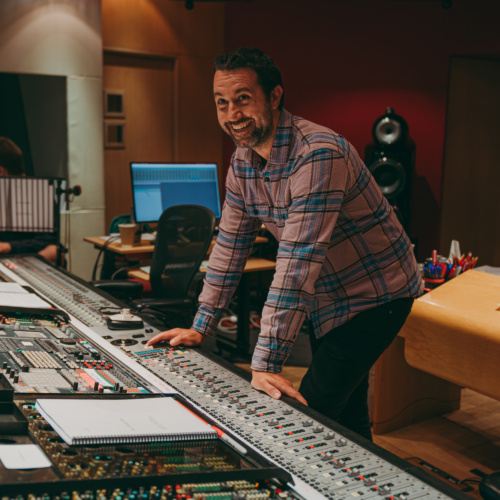
Jason LaRocca
Jason LaRocca, a Grammy-nominated engineer and mixer, is also known as the former singer/guitarist of the acclaimed punk band The Briggs. By the time he was eighteen, the Los Angeles native was already touring the world as a musician, while simultaneously establishing himself as a producer and recording engineer.
Jason’s extensive career spans both film and video game music. He has worked with major movie studios, recording and mixing music for blockbuster films like Bad Boys for Life, Paddington, Aquaman, The Flash, and the Oscar-winning documentary Icarus. His work in the gaming world includes mixing music for popular titles like Fortnite, God of War: Ragnarök, Call of Duty: Black Ops Cold War, Assassin’s Creed Valhalla, among others. True to his multifaceted approach, Jason often goes beyond engineering, producing scores and creating sound design and instrumentation for many of his projects.
In television, Jason’s expertise extends to score recording and mixing for a number of high-profile shows. His TV credits include The Lord of the Rings: The Rings of Power, Little Fires Everywhere, Justified: City Primeval, Fellow Travelers, Locke & Key, The Offer, Black Mirror, and Venom: the Last Dance.
Jason has also worked with top recording artists, including Jay-Z, CeeLo Green, Fiona Apple, ScHoolboy Q, and Serj Tankian of System of a Down, lending his engineering and mixing talents to some of the biggest names in music.
In 2023, Jason earned his first two Grammy nominations — one for his mixing work on the cast album of the hit Broadway musical Sweeney Todd: The Demon Barber of Fleet Street and another for Best Video Game Score for God of War: Ragnarök.
Photo credit: Kevin Matley
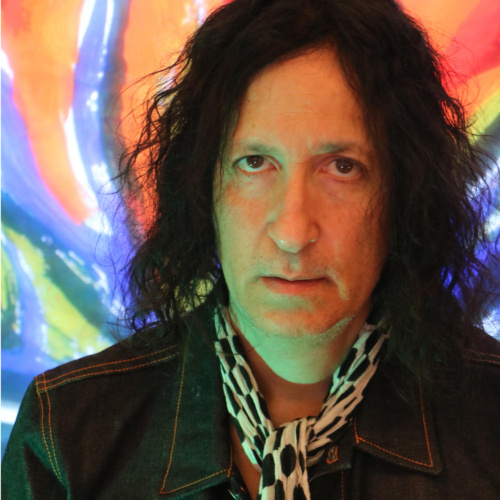
Gordon Raphael
Gordon Raphael, his mom and grandma Minnie knew that big things were possible when he won a Red Cross sponsored art contest at age six, whilst still in first grade in Pennsylvania. The awar winning painting which was sent around the world, featured a bird house with an entrance and exit, just like he had observed at his school.
At the age of 13, Gordon quit his traditional piano lessons to join his first (of 33 different) roc roll bands. Stepping onstage and performing at Jr High School dances at earsplitting volumes “sealed the deal” and for the rest of his life Gordon dedicated his time and energies to music; composing, performing, recording and producing during the last 5 decades.
With Sky Cries Mary during the Seattle grunge explosion, great signs of success and satisfaction appeared with several valuable recording contracts and a publishing deal in Beverly Hills (World Domination Records, Warner Bros Records and Windswept Pacific Publishing Toward the end of this great time for Seattle bands, he moved with his new band partner Ann Hadlock to New York City to continue his music career and gained a reputation in the East Village as a studio owner and producer-for-hire.
Playing locals shows with his group, Absinthee was very exciting— but when he discovered local NYC band, The Strokes and produced their first EP and subsequent two albums, things reall took off. Then came the good fortune to meet and produce Regina Spektor for her brilliant Sovie Kitsch album, which was eventually released by Seymour Stein (The Ramones, Madonna) on his SIRE Records label.
Gordon Raphael relocated to London then Berlin, and finally settled in West Yorkshire, UK in th pursuit of more and more interesting musical opportunities. By now Gordon has recorded 20 albums of his own music, produced over 200 bands, worldwide and as of 2022, became a author of a book titled, The World Is Going To Love This (Up From The Basement With The Strokes), via Wordville Press in London.
Believing that art and music are some of the most precious and worthwhile of all human activities, Gordon has championed young musicians and others drawn to creative callings. By nurturing the imagination, and protecting expressive tendencies towards originality and highly individualistic works, he has been cheerfully welcomed as a lecturer, speaker and music producer.
References
- 1Multiple. "Music Producer Salaries in United States". Glassdoor. published: February 10, 2024. retrieved on: March 23, 2024
- 2Dave S.. "These are the salaries of some of the top hip hop producers". Produce Like a Pro. published: 14 September 2017. retrieved on: 24 August 2021
